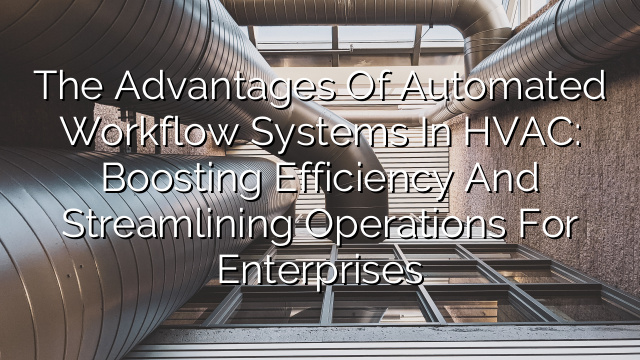Introduction
As technology continues to advance, businesses across various industries are seeking ways to streamline their operations and improve efficiency. This is especially true in the heating, ventilation, and air conditioning (HVAC) industry, where the need for automated workflow systems is becoming increasingly important.
The Importance of Efficiency in HVAC Operations
Efficiency is crucial in HVAC operations for several reasons. First and foremost, it allows businesses to save time and money. By automating manual processes and streamlining workflows, enterprises can reduce labor costs and maximize productivity. In a highly competitive industry like HVAC, these cost savings can make a significant difference in profitability.
Furthermore, increased efficiency leads to better customer service. With automated workflows, HVAC businesses can respond quicker to customer inquiries, provide accurate estimates, and deliver services in a timely manner. This enhances customer satisfaction and helps build a positive reputation for the company.
Lastly, automating workflows in the HVAC industry improves safety and compliance. HVAC systems require regular maintenance and inspections to ensure they are functioning properly and meet industry standards. Automated workflow systems can schedule and track these maintenance tasks, reducing the risk of equipment failure and ensuring compliance with regulations.
The Advantages of Automated Workflow Systems in HVAC
- Streamlined Processes
Automated workflow systems allow HVAC businesses to streamline their processes by eliminating manual tasks and reducing paperwork. For example, instead of manually entering customer information into multiple systems, an automated workflow system can integrate with customer relationship management software to automatically populate relevant data. This eliminates the risk of human error and saves time.
- Improved Communication
Efficient communication is essential in the HVAC industry, especially for businesses with multiple teams or remote workforce. Automated workflow systems provide a centralized platform for collaboration and communication, allowing employees to stay connected and share information easily. This improves coordination and reduces miscommunication between different departments or job sites.
- Better Resource Management
Automated workflow systems help HVAC businesses manage their resources effectively. These systems can track inventory levels, schedule equipment maintenance, and optimize service routes. By having real-time visibility into resource availability and utilization, businesses can minimize downtime, reduce waste, and improve overall operational efficiency.
- Data Analysis and Reporting
Automated workflow systems generate valuable data that can be analyzed to gain insights into business performance. By tracking key metrics such as response time, completion rates, and customer satisfaction, HVAC businesses can identify areas for improvement and make data-driven decisions. Additionally, automated reporting features make it easy to generate comprehensive reports for internal use or compliance purposes.
- Enhanced Customer Experience
Automated workflow systems enable HVAC businesses to provide a seamless customer experience. By automating processes such as scheduling appointments, sending reminders, and providing real-time updates, businesses can enhance customer satisfaction and build long-term relationships. Customers appreciate the convenience and efficiency of automated systems, which can translate into repeat business and positive referrals.
Frequently Asked Questions (FAQ)
- What types of HVAC operations can benefit from automated workflow systems?
Automated workflow systems can benefit all types of HVAC operations, including installation, maintenance, repair, and service. Whether it is a small local HVAC business or a large enterprise with multiple branches, automated workflow systems can streamline operations and improve efficiency.
- How long does it take to implement an automated workflow system in an HVAC business?
The implementation time for an automated workflow system depends on various factors, such as the complexity of existing processes and the size of the business. In some cases, it can be as quick as a few weeks, while in others, it may take several months. It is important to work closely with the chosen solution provider to ensure a smooth and successful implementation.
- Are automated workflow systems expensive?
The cost of implementing an automated workflow system can vary depending on the chosen solution and the specific needs of the HVAC business. While there may be upfront costs associated with software licenses and implementation, the long-term benefits of improved efficiency and productivity often outweigh the investment. Many solution providers offer flexible pricing options to accommodate businesses of different sizes and budgets.
- Can automated workflow systems integrate with existing software and systems?
Yes, most automated workflow systems are designed to integrate with existing software and systems commonly used in the HVAC industry, such as customer relationship management (CRM), enterprise resource planning (ERP), and inventory management software. This integration allows for seamless data flow and ensures that all relevant systems are connected and updated in real-time.
- Are automated workflow systems secure?
Automated workflow systems prioritize data security and employ various measures to ensure the protection of sensitive information. This includes features such as user authentication, role-based access controls, and data encryption. It is important to choose a reputable solution provider that complies with industry-standard security protocols and regulations.
Conclusion
Automated workflow systems offer significant advantages to HVAC businesses looking to boost efficiency and streamline operations. From streamlining processes and improving communication to better resource management and enhanced customer experience, these systems are a valuable investment for enterprises in the HVAC industry. By embracing automation, businesses can position themselves for success in a highly competitive and rapidly evolving market.






